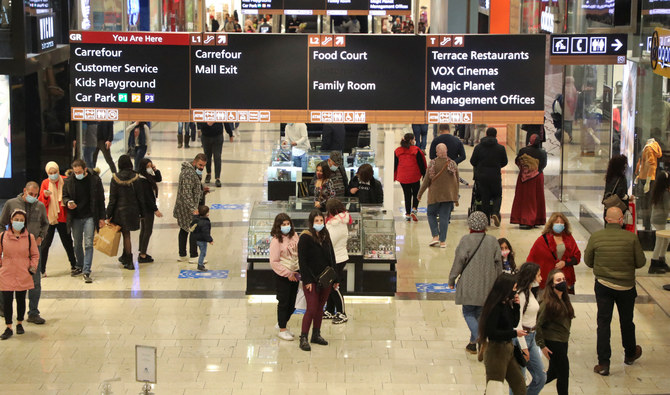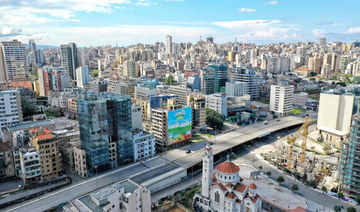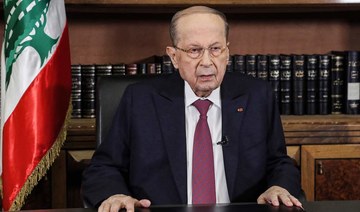BEIRUT: As the people of Lebanon prepare to greet the arrival of a new year, they are exhausted from the escalation of the suffering they endured in 2021.
A year marked by additional crises affecting the health sector, the judiciary and the military is ending amid increasingly frosty relations between the country’s political leaders.
Images of parents in tears because they are unable to buy medicine or milk for their children, and scenes of long queues at gas stations were among the most graphic illustrations of the humiliations citizens have been subjected to.
The value of the minimum wage of 675,000 Lebanese pounds fell to just $23 as the dollar exchange rate reached an unprecedented high of 29,000 pounds.
In the past 12 months, Lebanon has gone through crises described by the World Bank in June as “the most severe in the world.”
Monetary policies were blamed as the Lebanese Central Bank experienced a further sharp decline in foreign-currency reserves. It resorted to repeatedly printing more currency to secure the necessary liquidity, which fueled inflation.
In August, it stopped subsidizing imports of fuel, and then medicines. Workers now have to spend more than half of their salaries just to travel to work. The lives of many people are at risk because medicine is not available to buy or, if it is, they can no longer afford it.
Lebanon literally fell into darkness this year, as Electricite du Liban — the country’s main power company — was unable to provide minimum levels of electricity, and many people had to stop renting private generators as monthly costs soared.
The removal of state subsidies was not accompanied by any clear mechanism for protecting citizens from poverty, as a cash-card aid program for the poor and the middle class has yet to be approved.
The growing social instability was reflected in the security situation and rising crime rate in the country, with cases of theft increasing by 137 percent compared with 2020.
On Feb. 4, publisher and political activist Lokman Slim, a prominent critic of Hezbollah, was assassinated. He previously said he had received death threats from the group.
Meanwhile Hezbollah spared no effort to consolidate its control over the country, going so far as to threaten Judge Tarek Bitar, who is leading the judicial investigation into the Beirut Port explosion, accusing him of politicizing the investigation.
Despite Hezbollah’s challenges to the Lebanese government, and US sanctions, by importing fuel from Iran via Syria in September, it did not last long amid the ongoing crises.
A young man from an Arab clan in Khaldeh, south of Beirut, assassinated a Hezbollah official in August, and members of the same clan ambushed supporters of the party during the funeral of their colleague in Khaldeh, which led to the deaths of five people.
The height of the armed confrontation between Hezbollah and its opponents took place in Ain Al-Remmaneh in October, when a four-hour shootout among fighters armed with machine guns and missiles took place. Seven people died in the clashes and dozens were injured. The Amal Movement and Hezbollah accused the Lebanese Forces party of attacking protesters, loyal to Amal and Hezbollah, that were heading to the Justice Palace to demand the dismissal of Judge Bitar.
Since he took over the investigation into the Beirut Port explosion, it has been suspended seven times by politicians accused of involvement in the circumstances that led to the blast, including former Prime Minister Hassan Diab.
Meanwhile, former Prime Minister Saad Hariri resigned after he was unable to form a government of independent specialists to support a French aid initiative, reportedly because the process was obstructed by the Free Patriotic Movement and Hezbollah.
Najib Mikati took over and, after 13 months of political stalemate, formed a new government in September. The same old political forces were represented, however, and within a month its work was halted by Hezbollah and the Amal Movement.
The crisis in the country peaked toward the end of the year when Saudi Arabia and other Gulf countries cut diplomatic and economic ties with Lebanon in protest against offensive criticisms made by Information Minister George Kordahi about the war in Yemen.
The politician’s belated resignation failed to improve the strained relations, as Saudi authorities said that “Hezbollah continues to destabilize Lebanon and exports drugs to the Kingdom.”
As a result of the continuing economic crisis, and Lebanon’s inability to pay its dues for the work of the International Tribunal for Lebanon, the tribunal was permanently suspended in July.
The country faces two important political events in 2022: The parliamentary elections on May 15, in which thousands of expatriates will be eligible to vote, and a presidential election in October.
A great challenge remains the implementation of the reforms demanded by the international community as a condition for aid to help Lebanon overcome its economic and social crises.
Lebanon has at least been promised an improvement in the quality and reliability of its electricity supply, thanks to Egypt and Jordan, in coming year. And Lebanese security services have promised to continue their fight against the smuggling of drugs through the country.
Meanwhile, the global pandemic continues to rage and, as the new year begins, many people in Lebanon will be awaiting the results of tests, amid violations of the precautionary measures to slow the spread of the virus.
The Lebanese people will be hoping that these are the only negative results they see during what they desperately need to be a better year ahead.


























